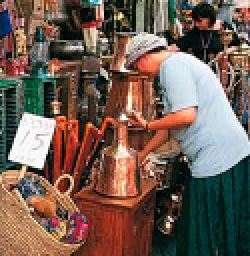Travel Reference
In-Depth Information
SHOPS AND MARKETS
W
hen it comes to shopping, the
in Akko, Amman, Hebron and Nazareth.
Anybody intending shopping in the
souks must become acquainted
with the art of bargaining. In con-
trast to the traditional nature of
the souk, bigger
centres such as
Jerusalem, Tel Aviv and
main attraction in Jerusalem is
undoubtedly the souks,
or bazaars, of the Old City. In
comparison with the great
bazaars of Istanbul or Cairo,
Jerusalem's souks can seem small
and overly touristy, but they
still reward exploration
(see
pp148-9)
. The streets of the Old
City away from the souks are also
dotted with interesting small
shops, handicraft centres, workshops
and boutiques. Most other towns and
cities throughout the Holy Land also
have souks, with particularly good ones
A Amman,
all possess modern shopping
districts, as well as large American-
style malls, filled with familiar
brand names from the West.
In Jordan, the major tourist
sites such as Petra and Jerash have
small clusters of tourist-oriented shops
where, sometimes, you can find local
handicrafts and products of interest.
Armenian
ceramic tile
Jordan and Sinai use of
any other currency is
illegal), but in Israel, if
you are making a large
purchase, it is possible
to get a discount by
paying in US dollars.
This is because transac-
tions made in a
foreign currency are not
subject to Israeli VAT.
VAT EXEMPTIONS
A wide range of goods
A
in Israel is subject to a
Value
V Added Tax (
Mam
(
in Hebrew) of 17 per
cent. Tourists are entitled to a
refund on this for any
purchases amounting to over
400 shekels (about US$100).
Make sure the shop you buy
from has a VAT (or tax) refund
sign displayed. You need to
ask the sales assistant for a
special invoice showing the
VAT paid in both dollars and
shekels. This is then presented
at the VAT counter at the
airport at the time of your
A typical fruit and vegetable stall
OPENING HOURS
out the Holy Land close
30 minutes to one hour
before sunset.
All Jewish-owned busi-
nesses in Jerusalem and
throughout Israel close from
Friday afternoon to sunset on
Saturday for Shabbat
(Sabbath). These shops are
also closed during Jewish
holidays
(see pp36-9)
.
Throughout the Holy Land
there are often no strictly
defined opening hours; it
depends on the individual
proprietor. In general,
however, except for food
shops, which open quite
early, business activity begins
at roughly 9am. Some shops
close from 1 to 4pm (this
is particularly the case in
Jordan), but most remain
open all day until around
7pm. In Jerusalem's Old City
and elsewhere, the souks
don't really get going until
perhaps 10am and they close
around sunset. Many shops
and stalls in the souks are
closed all day Sunday, as
many of the shopowners are
Christian, although others are
Muslim and they stay closed
on Friday instead. During the
holy month of Ramadan,
Muslim-owned shops through-
HOW TO PAY
Major credit cards, such as
Visa, American Express and
Master Card, are accepted in
almost all shops throughout
Israel; travellers' cheques are
not. In Jordan and Sinai,
credit cards are less widely
accepted. Only in top-end
and mid-range hotels and
international restaurants are
cards usually accepted; in
most places, you will have to
pay in cash. It is usual to pay
in the local currency (in
Examining the wares at an Old City
souvenir shop

















